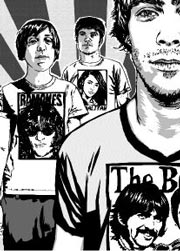NO YEAR-END roundup is complete without a remembrance of the dearly and recently departed, and in many ways, 2001 was like any other. We said good-bye to a revered, though faded pop icon (the Mamas and the Papas’ John Phillips), an old-time blues great (John Lee Hooker), and a beloved crooner (Perry Como), among many others. But Phillips, in all honesty, was lucky to go on as long as he did with such Keith Richards-esque disregard for the effects of substance abuse, and Hooker and Como were, even by the most generous standards, no spring chickens. Though many minor and major musical figures will be deeply and honestly missed, it is one particular triumvirate of loss—the passing of Joey Ramone, Aaliyah, and George Harrison—that left the most drastic imprint on this year in music.
It’s almost impossible to imagine three more far-ranging figures in the business; to attempt to tie the trio together with some neat eulogistic bow would be folly, if not an impossibility. But the three did share undeniably potent and precious talents—whether for joyous three-chord punk nuggets, legendary rock classics, or precocious R&B innovations—and each left behind a world that felt smaller and sadder without them.
Harrison is by far the best known, the “quiet” Beatle who was only considered a minor talent in the light of his larger-than-life bandmates. For any other group, songs like “Something” and “While My Guitar Gently Weeps” would have been the pinnacle; instead, they are just a few in a vast outstanding catalog. Still, an occasionally brilliant (if spotty) solo career, a hugely influential foray into Eastern mysticism and music, and the famous concerts for Bangladesh leave their own considerable legacy.
Baby boomers weren’t the only ones to lose a hero. Joey Ramone—the shy, gawky, all-legs-and-no-chin kid from Queens who went on to become one of the unlikeliest and most enduring heroes of punk rock—was claimed by cancer before his 50th birthday, and a different generation mourned. The Ramones’ glory days were long past when Joey died, but they had only ceased playing together in the mid-’90s, and Joey was at work on a solo project at the time of his death. Though the foursome never once cracked the top 10, the spirit of Johnny, Tommy, Dee Dee, and Joey still pumps out from crappy stereos in the basement bedrooms of a thousand disaffected teens—whether they’re actually listening to The Ramones Leave Home, or the three-minute thrash-and-burns of the countless bands inspired by them.
There is no decades-spanning retrospective possible for Aaliyah, but the 22-year-old singer-actress lived a remarkably full creative life right up until the day in August she and eight others were killed in a small-plane crash. Although her career began in 1994 under the Svengali-like control of R&B phenom R. Kelly (rumors of a secret marriage between him and the underage star plagued the two for years), the Bahamas-born, Detroit-bred teen proved she could do even better without him, releasing increasingly mature and interesting material, frequently in collaboration with ber producer Timbaland. Shunning the over-the-top vocal style of other R&B acts, Aaliyah’s remarkable restraint made for productions that simmered with an erotic and emotional tension belying her age and experience. The artist known as “Baby Girl” to her fans and friends had already garnered an impressive number of gold and even multiplatinum records and singles, and begun work on a number of films, including a much-anticipated sequel to The Matrix, at the time of her death. Though her passing may not have registered much in the rock arena, its impact on the world of hip-hop and R&B was massive, as witnessed by the enormous public turnout for her funeral in New York City and memorial services across the country—not to mention her just-released self-titled album’s instant rise to Billboard‘s top spot. She was an artist with more to show than her time allowed her to reveal. The grieving for Aaliyah and for those who had much more time to make their marks will continue long after the year changes over. But as Harrison said himself, all things must pass.
Leah Greenblatt








